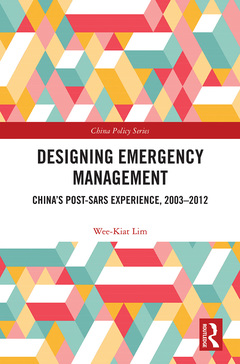Description
Designing Emergency Management
China’s Post-SARS Experience, 2003-2012
China Policy Series
Author: Lim Wee-Kiat
Language: English
Subjects for Designing Emergency Management:
Keywords
Risk Governance Framework; Emergency Management Field; Disaster aid assessment; Organizational Field; China's risk and emergency management; Emergency Management; Governance reforms; Emergency Response Law; Risk management; Emergency Management Establishment; EMO; Public policies; SARS Crisis; COVID-19 pandemic; Emergency Response Plan; China; Insider Cultural Knowledge; Severe Acute Respiratory Syndrome; Party State Ideologies; Public Administration; State Master Plan; Institutional Evangelists; Public Health Emergencies; FEMA; Emergency Management Office; National Emergency Management; SARS Virus; Field Events; SARS Outbreak; Cognitive Legitimacy; Risk Governance; Harmonious Society; Disaster Risk Reduction
Publication date: 05-2022
Support: Print on demand
Publication date: 11-2020
· 15.6x23.4 cm · Hardback
Description
/li>Contents
/li>Readership
/li>Biography
/li>
This book looks at the then-nascent emergency management sector in China, specifically the 2003?2012 period, that arose from the 2003 SARS crisis and subsequently set the stage for its responses to the COVID-19 pandemic.
Covering not only the amended and new laws and regulations at the national level, the book also includes the rearrangement and creation of the organizational structures, as well as the response plans for individual emergencies that were either recrafted or created during this period. Beyond chronicling the milestones and products of this transformation, this book highlights the key ideas and ideals that guided the various stakeholders, from the governing elites to the policy experts during this process.
The book demonstrates how definitions of emergency management and emergency categories, as well as other ideational objects, were initially either absent or weakly developed, but were refined to the extent that they helped corral disparate actors into China?s new organizational field of emergency management.
Prologue Designing Through Distress: Creating A New Organizational Field of Emergency Management in Post-SARS China. Chapter 1 Assembling the Theoretical Toolkit: Conceptualizing the Field and Its Formation. Chapter 2 Intensive Institutionalization (2002-2007). Chapter 3 Consolidation and Stabilization (2008-2012). Chapter 4 Risk Governance as A Framework for Emergency Management. Chapter 5 Taming Rivers, Saving Sheep, And Using Science: Legitimizing Claims Using Cultural Knowledge and Party-State Ideologies. Chapter 6 Governmentalization Of Emergency Management. Chapter 7 "Field" Work: Building A New Emergency Management in China. Epilogue Going Forward. Appendix - Research Methods
Wee-Kiat LIM is Associate Director, Centre for Management Practice at Singapore Management University. Since 2006, Wee-Kiat has been investigating how organizations make sense of, prepare for, and respond to sociotechnical disruptions. His research interests lie at the intersection of risk, disaster, and organization. Besides academic research, he has written and taught cases on organizations that are based in China, Indonesia, and Singapore, covering issues related to innovation, entrepreneurship, crisis management, and governance. Wee-Kiat holds a PhD in Sociology from University of Colorado Boulder, specializing in sociology of disaster and a Bachelor of Communication Studies (Hons.) from Nanyang Technological University, Singapore

